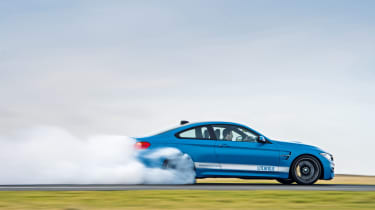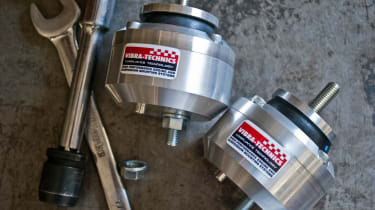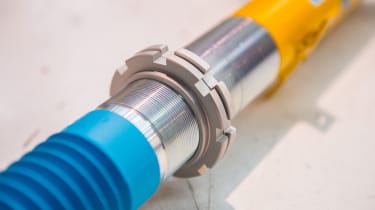Long live modified cars – The organisation tasked with keeping tuned cars legal
The Performance Automotive Aftermarket Association represents UK-based tuning companies and protects the aftermarket industry
Somewhere along the line modified cars, and the people who own them, got a terrible reputation. But the shoddy bodykits, extremely loud exhausts and cheap coilovers that you see on cars crawling around fast food restaurant car parks or speeding down high streets are only a tiny proportion of aftermarket tuning, even if that is what most people think of.
Less popular with the mainstream media than this caricature is an entire industry of reputable companies making and supplying exceptionally well-engineered parts and tuned vehicles. Yet, for many the entire aftermarket industry is seen to exist just to create cars that annoy old ladies and keep you awake at night.
This reputation is actually quite dangerous for the whole tuning industry. Without a proper understanding of the modifying and engineering companies that make up the aftermarket, officials who are tasked with creating legislation around modifying road cars could be influenced by this false reputation.
> Read our review of the Revo modified Volkswagen Golf R
To fly the flag for modified cars and bolster the reputation of the businesses involved, a collection of UK aftermarket companies have set up the Performance Automotive Aftermarket Association (PAAA). The group includes suspension, spring, bush, exhaust and seat manufacturers as well as companies that tune and remap cars.
To get a better understanding of why the association needs to exist we’re meeting with Greg Kirby from Eibach, David Power of PowerFlex and Jonathan Douglas from ITG, three of the PAAA’s five board members.
Kirby explains what prompted the creation of the group: ‘It was a particular piece of legislation surrounding the periodic technical inspection, what we call an MOT. Within that document there was this ambiguous statement: “The tester must ensure that all parts comply with the manufacturer’s original specification.”
‘And you sort of think about that for a minute. That’s to get your car an MOT, to get your car legal for the road and your insurance etcetera, etcetera.
‘We were mortified by this. Our springs are a different rate for a good reason. We’ve all engineered our bits to be different. And this, if interpreted to the letter, means our whole industry just [clicks fingers] collapses.’
So, without a body representing aftermarket tuning companies where do legislators go to learn about what’s being done to tune and modify cars? And where do they find out what’s safe and what should be legal?
‘The danger is that they say, “So who should we talk to about springs? Oh we’ve got to talk to the people who make the cars.”’ Jonathan answers.
‘They go and talk to the people who make the cars and they just say it’s preposterously unsafe to allow anyone to change the springs on their car.’
Kirby adds, ‘They’re worried about warranty claims. If something goes wrong with their car, whether its the modifications or not, they look bad.’
Power explains it isn’t just the manufacturers that are a potential problem. ‘Most MEPs and MPs can’t be experts. If you put something in front of them that says “It’s safer if you do it like this,” 99 per cent of them haven’t got the time or knowledge to dig down and see what’s really being said. So they think, safer, oh yes, tick.’
With a group like PAAA actively campaigning and lobbying governments and legislators they can start to inform MPs and officials so they understand the aftermarket better. That way they, hopefully, won’t create laws that eradicate a reputable industry that creates skilled jobs and pushes engineering innovation.
The need for the association has become important right now because car manufacturers have seen the success of the aftermarket and are starting to replicate it. Dealer-fit exhausts, suspension and even departments like Jaguar’s SVO that modify whole cars, essentially do exactly what tuning firms and the aftermarket have been doing for years.
But, with their sizable budgets, the OEs could have the influence over legislators to outlaw modifications that aren’t performed or completely controlled by themselves. This hasn’t happened yet, but grouped together in the PAAA, the UK aftermarket has a better chance of combatting any potential attack should it arise.
A seriously diminished or non-existent aftermarket in the UK would also see our motorsport industry suffer significantly. Douglas goes into detail: ‘Many of us do 80 or 90 per cent of our work in the tuning industry, but we also supply the racing industry.
‘At ITG we supply into Formula 1 teams, Le Mans, off-road racing, all GT classes, touring cars… we do all that. But it’s a tiny part of the business.
> Read what a 1200bhp Nissan GT-R, tuned by Litchfield, is like on track here
‘We’re involved in motorsport to wave our flag and to develop new technologies, but we do this so we can profitably employ said brands and said technologies in the aftermarket. And so do many of the business in our association. If they were put out of business, that would harm the motor racing industry.’
It isn't just the tuning comanies that go racing, manufacturers compete to promote their own products, and they do this using parts from aftermarket suppliers. If the OEs attempt to destroy the tuning industry with their own aftermarket-style modifications – that, incidentally, mostly use parts from the traditional aftermarket suppliers, often off-the-shelf ones – they’ll also take away their racing parts suppliers. ‘We’re more interlinked with car manufacturers than they think,’ adds Douglas.
The PAAA has ambitions away from discussions in stuffy meeting rooms with suits, too. It has aspirations to be like the Specialty Equipment Market Association (SEMA) in America and as such, the PAAA wants a show that’s a massive spectacle like SEMA’s in Las Vegas. This summer, there will be a PAAA village at established tuning shows with lots of the members represented with their own stands. If successful, the village will eventually become its own show.
If the PAAA follows the same trajectory as SEMA it wouldn’t just be an association that protects the industry, but could be one that transforms it. Not only will there be a vast show, it could help move the attitude of the market similar to that of the American tuning industry, where manufacturers embrace the aftermarket and actively sell cars to people who want to modify them. With manufacturers on-board, the misconception that modified cars are only driven by spotty teenage criminals will hopefully quickly disappear, too.






